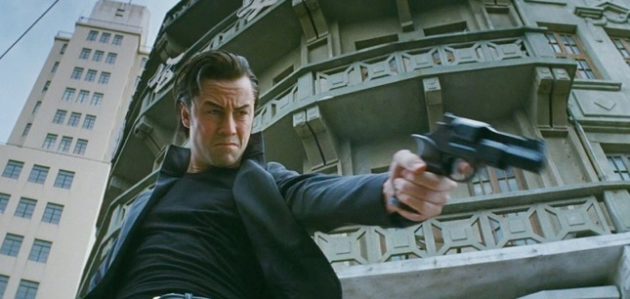REVIEW: Joseph Gordon-Levitt Confronts His Future In Smart, Soulful Looper

Missing mothers, lost wives, abusive and indifferent father substitutes — Looper may be a movie powered by time travel, but its emotional fuel is abandonment. The new film from Brick director Rian Johnson is a clever, clever contraption about trading in your future to feed your present, and the lost boys and regretful men who willingly embrace such a bargain already believe they have nothing to live for or look forward to. Thirty years of kicking around with a lot of cash in your pocket looks like a pretty good bargain when you're gazing down at it from in front of all that time, but when those last few days are running out, you might not be so ready to go.
Looper may not have the bell-ringing resonance of Chris Marker's La Jetée, one of its touchstones, but it's a jaunty match-up of genre and character drama that's far smarter and more finely wrought than almost anything else in the multiplexes. The film's set a few decades in the future, where technology's a little better and life in general is worse, at least in the Kansas metropolis in which Joe (Joseph Gordon-Levitt) lives. Looper's setting of a midlevel Midwestern city and the ragged, lived-in feeling of its 2044 are a pleasingly off-kilter approach to its sci-fi premise.
We don't know what the government's like in this year, or what the larger world's become because it's not so important to Joe, a young man who's building up cash reserves and easing his off-hours with drugs until he's free to move to France. Joe's a looper, a job he explains with a matter-of-fact lack of curiosity: when time travel is invented a few years from his present, it's instantly outlawed and used only by organized crime for assassinations. Murders will have become so hard to hide that it's easier to send targets back to Joe's era, where they can be neatly offed and disposed of by eager young men like our hero, guys who have accepted their own disposability.
Joe's self-interest is central to both the film's premise and the way it avoids most of the tougher theoretical questions about time travel, paradoxes, how the technology works and whether people are using it for more ambitious purposes. He doesn't care. He started out on the streets, and looping has provided him with a nice apartment and enough money to get high and to buy time with his favorite working girl Suzie (Piper Perabo). Like the town in which he lives, Joe's nowhere near the top of the food chain, and has no interest in climbing. He's just waiting on his big payout that will come once he closes his loop by killing off his future self — part of the devil's bargain that all loopers make.
Looper is built around our buying Bruce Willis as Joe's future self, a feat that rests more on a wry impersonation by a prosthetics-aided (and very good) Gordon-Levitt than on the older actor. When the tougher and more world-weary Old Joe is sent back in time to die, he arrives with a mission in mind, but his younger self has no desire to hear it. The scenes in which the two Joes confront each other at a diner are among the film's best. Youth and experience are unable to relate — even though they're technically the same person — because their priorities are completely different. It's an amusing and dishearteningly well-articulated take on how useless it would be to be able to offer your younger self advice when your younger self isn't ready to hear it.
While it's no looper contract, we do trade in our future for present enjoyment in small ways all the time (by, for instance, taking up smoking or by spending money instead of saving it). Looper offers an even-handed look at both perspectives, even as it sends Old Joe off to make a terrible exchange on behalf of the future and follows younger Joe as he goes on the run and ends up taking shelter on a farm on which a woman named Sara (Emily Blunt) lives with her young son Cid (Pierce Gagnon). After a stylishly noir first half that's simultaneously futuristic and retro — "20th-century affectation," Joe's boss Abe (Jeff Daniels) sneers at his employee's preference for ties — Looper becomes more thoughtful and a little more jumbled in its second section, as it slows down for Joe to find some human connection for the first time in his adult life.
With touches of The Terminator, the aforementioned Marker film and the inspired-by-it 12 Monkeys, a classic episode of The Twilight Zone and more, Looper is aware of its sci-fi legacy, but manages plenty of unique touches all its own. The depiction of Kansas is one, combining future tech and a farming lifestyle unchanged by the advance in time. A sequence in which Joe's colleague Seth (Paul Dano) meets an unfortunate fate is innovative in its horror. But despite the fleet-footed flash of its storytelling, what's most impressive about Johnson's movie is its dark-edged faith in people being able to change despite the path on which they've been set. If all we'll ever be is a product of the circumstances in which we grew up, then time travel's almost unnecessary -- the future's predetermined. It's choosing something new that may be as clear a sign as we ever get of a soul.
Follow Alison Willmore on Twitter.
Follow Movieline on Twitter.

Comments
Movie of the year so far.